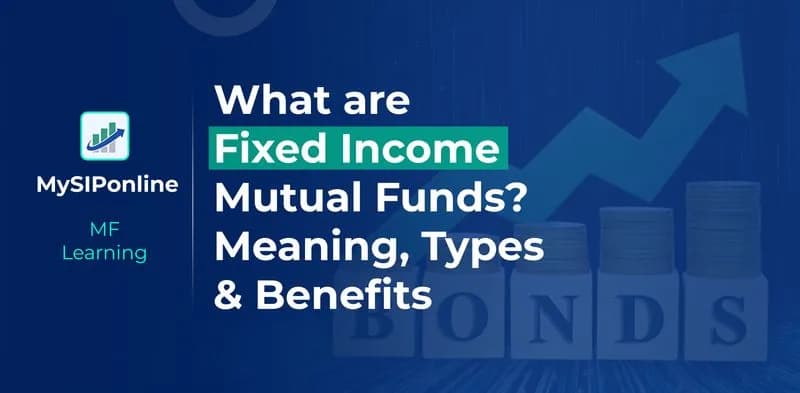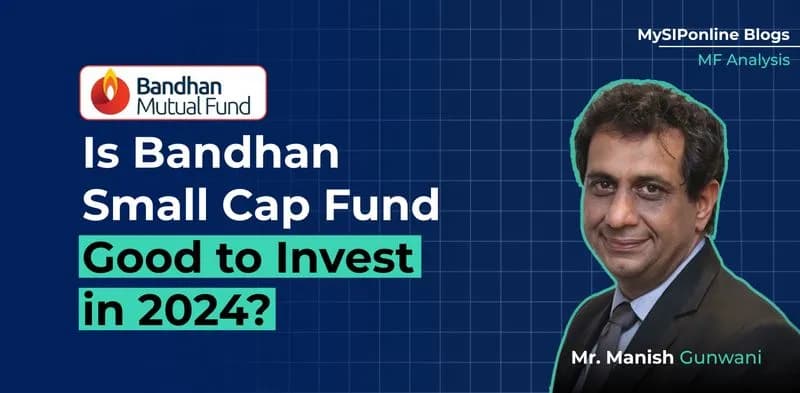Table of Contents
- Nippon India Corporate Bond Fund - Growth Plan - Growth Option
- SBI Magnum Gilt Fund - Regular Plan - Growth
- ICICI Prudential Medium Term Bond Fund - Growth
- ICICI Prudential All Seasons Bond Fund - Growth
- HDFC Dynamic Debt Fund - Growth Option
Introduction
Welcome to the world of Fixed-Income Mutual Funds, where investing is made simple and rewarding. These funds offer a smart way to grow your money steadily while enjoying regular returns. Imagine putting your money into a variety of safe options like government bonds, corporate bonds, and other trusted investments. Let’s find out together if it's worth your investment or not.
What are Fixed Income Mutual Funds?
Fixed-income mutual funds, also known as debt funds, are investments where many people put their money together to buy different types of loans. These loans can be from the government, companies, or other institutions. The main goal of these funds is to give investors regular payments and keep their investments safe. Professional managers handle these funds, making smart choices to earn the best returns and lower the chances of losing money. These funds are good for people who want a steady income and don't want to take big risks like investing in stocks. They also have tax benefits and are good for people who want to protect their money while it grows.
How do Fixed Income Mutual Funds work?
Fixed-income funds or debt funds are created with diversified portfolios of different types of loan or debt securities like government bonds, corporate bonds, treasury bills (t-bills), discounted bills etc.
The government and some corporate companies issue these debt or loan securities to raise money to fund their day-to-day operations or finance large projects.
So they should pay regular interest (coupon rate) and return the principal amount at the time of maturity. But since they are tradable in the market investors could also generate capital gains by smart investing like either buying at discounted prices or selling the bonds at premium prices by properly analysing the economic and interest rate situations.
Let’s understand how these bonds work with the help of an example:
- If a company issues a 5% bond with a Rs1,00,000 face value or per value that is said to be matured in 5 years.
- Considering this bond is available at the premium price of 105000
- Through the period of contract, the company will pay you interest payments called coupon payments based on the rate of 5% per year.
- This means you will get Rs5000 per year and at maturity, you will be repaid your initial amount of Rs.1,00,000.
- But if you plan to sell the bond again in the market let's say for 108000.
- So you received a fixed interest rate of 5000 for two years and a capital gain of 3000 (108000-105000)
So Mutual Funds have different types of strategies to invest the money of debt funds in the bond market. Let's explore one by one:
Accrual Strategy Funds
These funds have a focus on investing in bonds and debt-related securities to earn regular interest income. They choose assets that pay consistent interest, aiming to give investors stable returns over time. Therefore they prefer high-interest or coupon-rate bonds and hold for the long term. Through this, they maintain consistent interest income for the funds.
Duration Funds
These funds aim to make a return with a capital gain strategy. Like buying discounted prices bonds and selling at premium prices. So they handle the risk related to interest rate changes. They adjust their bond holdings based on their expectations for future interest rate changes.
If interest rates are expected to fall
The fund manager might choose longer-duration bonds.
- 100% Paperless
- No Transaction Charges
- Easy to Invest
- Safe & Secure
Understanding the various types of Fixed Income Mutual Funds
Short-Term Funds
- These funds mainly invest in debt schemes with shorter investment durations like 6 months to 1 year.
- Investments in short-term funds focus on providing you with stable and more liquidity generating medium returns in a short time.
- They invest in Short-Term Government Securities, certificates of deposit (CDs), commercial paper, treasury bills, and short-term corporate bonds.
- If you have limited time for investment, these funds are the ideal choice for you.
- You can park in these funds temporarily while maintaining liquidity and earning a slightly higher return than traditional savings accounts.
Long-Term Funds
- Long-term funds invest in equities and fixed-income assets having maturity periods of more than three years.
- The primary goal of these funds is to achieve capital appreciation over the long term.
- They offer investors exposure to a diversified portfolio of stocks and bonds, including large-cap, mid-cap, and Small-Cap Stocks, as well as long-term government and corporate bonds.
- Long-term funds are ideal for investors with longer investment horizons, such as retirement planning or wealth accumulation goals.
- These funds successfully withstand market volatility and generate higher potential returns.
Corporate Bond Funds
- These funds are issued by corporate companies with the main focus on raising capital.
- A Corporate Bond of a company is defined by its credit score or quality. Good credit quality means the interest rate offered to the investors will be lower and returns will be higher.
Government Bond Funds
- These funds invest in bonds issued by governments or Government Entities.
- These are regarded as safer investments since they are guaranteed by the government's credit, which provides security and income, but at lower returns than corporate bonds.
Credit Funds
- Credit Funds, often known as high-yield or Junk bond Funds, invest in bonds issued by corporations with low credit scores.
- These bonds have the potential for higher returns, but they also carry more risk because the company may be unable to repay the money borrowed.
- These funds are popular among investors looking to increase the return on their investments, but they are carefully managed to assess the creditworthiness of the firms issuing the bonds and minimize the risks involved.
- Zero Fees
- Free KYC Check
- Best SIP Plans
- Track & Manage Investments
Time to Identify the Key Benefits of Fixed Income Mutual Funds
Will investing in this scheme will benefit you or not? Let’s find out by looking at the merits of Fixed income Mutual Funds.
Stable Returns
- The reason that Debt funds always have a higher traditional edge than bank FDs is because bond yields (returns) and bond processes are inversely related.
- When the interest rate in the economy starts to fall, the existing prices of the bonds which are of the higher coupon, will give you higher returns than what they are currently giving.
Liquidity
- Liquidity means how easily you can sell your assets without negatively affecting the market price. Debt funds offer more liquidity that provides investors flexibility and access to funds when needed.
Lower Market Volatility
- Debt investment gives lower risk compared to equities or other riskier assets. This is because fixed-income securities, such as bonds, provide an ongoing source of income over time and are less impacted by short-term market changes.
Conclusion
As you have seen, Debt Mutual Funds have a proven track record of providing potential returns during market volatility. When there was a need for stability, debt schemes were available. So, similar behaviour may be expected in the future, which is important for a conservative portfolio.
With this, we complete our talk for today. Now, if you are an investor worried about the volatility of the equity market but want to create excellent returns by investing in mutual funds, do not wait and start your SIP in these schemes as soon as possible.











